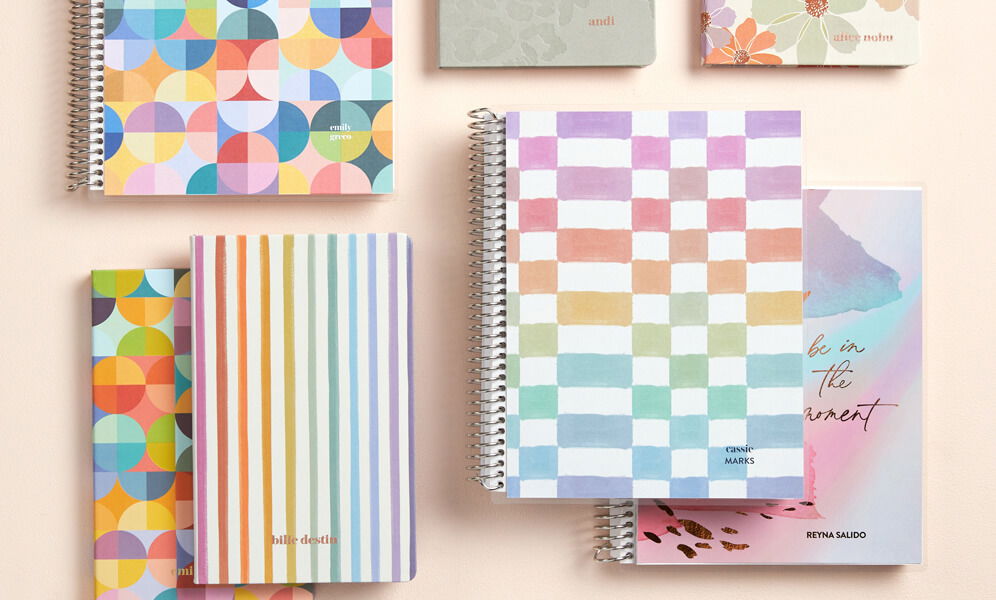How to Start Journaling for Beginners

Journaling is a powerful tool that can transform your life in countless ways. As organization enthusiasts who swear by paper planners for managing stress, time, and focus, we can attest to the remarkable benefits of journaling. Whether you're looking to enhance your productivity, reduce stress, or simply document your thoughts and experiences, starting a journal can be a game-changer.
Studies indicate there’s a wealth of benefits linked to journaling, which is why we’re excited to share helpful insights and easy-to-follow tips on how to start journaling for beginners. As for those getting back into journaling, this is for you, too! (Take it from us, it’s okay if you’ve started and stopped journaling and are starting again. It’s a personal journey … with a benefit around every bend.)
How to Start Journaling for Beginners
Decide What Type of Journal You Want to Keep.
The first step in embarking on your journaling journey is to decide what type of journal you want to keep. Are you interested in a daily diary to record your thoughts and experiences? Or perhaps you're more drawn to a gratitude journal, where you can express appreciation for the good things in your life. Different types of journals include dream journals, self-care journals, art journals, or bullet journals for organizing tasks and goals.
Take some time to reflect on your goals and interests to determine the type of journal that resonates most with you. It's essential to decide what type of journal best suits your needs and preferences. Below are a few popular options to consider:
You may also fine How to Set and Achieve Goals with Journaling super-helpful–both for journaling and productivity!
Bullet Journals

Bullet journaling has gained popularity in recent years as a customizable system for organizing tasks, goals, and thoughts. Developed by Ryder Carroll, the bullet journal method utilizes a simple system of bullet points, symbols, and signifiers to track daily activities, events, and ideas. With a bullet journal, you have the freedom to design your layouts, spreads, and trackers to suit your unique needs and preferences. Whether you're looking to boost productivity, foster creativity, or cultivate mindfulness, a bullet journal can be a powerful tool for staying organized and focused.
Spiral Notebooks
Spiral notebooks, also known as spiral-bound or coiled notebooks, are a practical and versatile option for journaling. These notebooks feature pages that are bound together with a metal or plastic coil, allowing them to lay flat for easy writing. Spiral notebooks come in various sizes, from pocket-sized to oversized, making them suitable for different journaling styles and purposes. Whether you prefer lined pages for structured writing or blank pages for creative expression, spiral notebooks offer flexibility and convenience for your journaling needs.
Planner Journals
Planner journals offer a structured approach to journaling, combining the functionality of a planner with the reflective nature of a journal. These journals typically feature pre-designed layouts and prompts that guide you through daily, weekly, or monthly reflections. Popular examples are the LifePlanner™ and Monthly Planner. These planners are designed with colorful layouts, goal-setting pages, and inspirational quotes to help you stay organized and motivated while journaling. With sections for scheduling appointments, tracking tasks, and jotting down thoughts, planner journals provide a comprehensive framework for integrating journaling into your everyday life.
Softbound Notebooks
Softbound notebooks, also known as bound journals, are a classic choice for traditional journaling habits. These journals feature pages that are glued together along the spine, creating a sleek and seamless appearance. Softbound journals come in various cover materials, such as leather, fabric, or paper, giving you the option to choose a style that reflects your personality and taste. With their compact and lightweight design, softbound journals are perfect for carrying with you on the go, allowing you to capture thoughts and memories wherever inspiration strikes.
Choose a Notebook.

Once you've decided on the type of journal you want to keep, it's time to choose the perfect notebook. As paper planner lovers, we understand the importance of finding the right notebook that suits your preferences. Consider factors such as size, paper quality, and binding style. Whether you prefer a sleek leather-bound journal or a colorful spiral notebook, find one that sparks joy and inspires you to put pen to paper.
Start with Gratitude.
One of the most powerful ways to kickstart your journaling practice is by incorporating gratitude into your entries. Take a few moments each day to reflect on the things you're thankful for, whether it's a beautiful sunset, a kind gesture from a friend, or a delicious meal. Cultivating an attitude of gratitude can have profound effects on your mental health and emotional well-being, helping you to focus on the positive aspects of your life even during challenging times.
You may also want to learn How to Start Mindfulness Journaling + Why You Should.
Write Freely.
One of the beauties of journaling is that there are no rules or limitations. It is a safe place to allow yourself the freedom of writing openly and honestly, without fear of judgment or criticism. Your journal is a safe space for self-expression, where you can explore your thoughts, feelings, and ideas without reservation. Don't worry about grammar, spelling, or punctuation—just let the words flow from your heart onto the page.
Find a Routine That Works for You.
Consistency is key when it comes to journaling, so it's important to establish a routine that works for you. Whether you prefer to write first thing in the morning, before bed, or during your lunch break, find a time that fits seamlessly into your daily schedule. Set aside dedicated time each day to nurture your journaling practice, treating it as a sacred ritual for self-reflection and introspection. You may want to consider using a daily routine journal.
Get Creative.
Journaling is not just about writing—it's also an opportunity to unleash your creativity. Experiment with different mediums such as drawing, painting, collage, or even photography to enhance your journal entries. Incorporating visuals can add depth and richness to your reflections, allowing you to express yourself in new and exciting ways. Don't be afraid to think outside the box and let your imagination run wild.
Discover How to Keep a Gardening Journal + 11 Ideas to Inspire You.
Tips on Journaling for Beginners

Do Not Stress Over Perfection.
It's important to remember that journaling is a personal journey, and there's no such thing as a "perfect" journal entry. This is your stress release journal, embrace imperfection and allow yourself to make mistakes along the way. Your journal is a reflection of your unique experiences and perspective, so don't put unnecessary pressure on yourself to create flawless entries.
You may want to check out Journaling for Your Mental Health + Where to Start.
Keep Your Journal Close.
Make it a habit to carry your journal with you wherever you go, so you can capture moments of inspiration or insight as they arise. Whether you're at home, at work, or out and about, having your journal nearby allows you to seize the opportunity to document your thoughts and experiences in real time.
Write for Your Eyes Only.
Your journal is a private space for self-expression, so it's important to establish boundaries and keep your entries confidential. Write with the understanding that your journal is for your eyes only, and resist the temptation to share intimate details with others unless you feel comfortable doing so. Honoring the privacy of your journal allows you to be truly authentic and vulnerable in your writing.
Explore What Is a Travel Journal + How to Make One with Examples.
Use Prompts for Inspiration.

If you're ever feeling stuck or uninspired, don't hesitate to turn to journal prompts for guidance. Prompts can help spark new ideas, stimulate creativity, and deepen your self-awareness. Whether you're exploring themes of gratitude, self-discovery, or personal growth, there are countless journal prompts available online or in books to ignite your imagination and enrich your journaling practice.
Here Are 10 Journals Prompts to Get Started.
1. Gratitude Journaling: Reflect on three things you're grateful for today and why they are meaningful to you.
2. Self-Discovery: Describe a moment when you felt truly proud of yourself. What did you accomplish, and how did it make you feel?
3. Dream Exploration: Imagine your ideal day from start to finish. Write about what you would do, who you would spend time with, and how you would feel throughout the day. Learn more with How to Start a Dream Journal.
4. Mindfulness Journaling: Take a few moments to observe your surroundings and write down five things you can see, four things you can touch, three things you can hear, two things you can smell, and one thing you can taste.
5. Emotion Journaling: Write about a recent experience that made you feel a strong emotion, such as joy, sadness, anger, or fear. Describe how you felt and how you handled the situation.
6. Goal Setting: List three goals you want to accomplish in the next month, year, or decade. What steps can you take to achieve these goals, and how will you measure your progress?
7. Inspiration Reflection: Write about someone who inspires you and why. What qualities do they possess that you admire, and how can you incorporate those qualities into your own life?
8. Creative Expression: Close your eyes and imagine yourself in a peaceful setting, such as a forest, beach, or mountains. Describe the sights, sounds, and sensations you experience in vivid detail.
9. Reflection on Challenges: Think about a difficult situation you've faced in the past and how you overcame it. What did you learn from the experience, and how has it shaped who you are today?
10. Future Self Visualization: Write a letter to your future self, describing where you see yourself in five or ten years. What goals do you hope to have achieved, and what advice would you give to your future self?
You can also use Guided Journals with built-in prompts based on specific themes and goals.
Starting a journaling practice can be a transformative journey that enhances your overall well-being and enriches your life in profound ways. As organization enthusiasts who value the power of paper planners for managing stress, time, and focus, we encourage you to embrace the art of journaling as a tool for self-discovery, reflection, and growth. Whether you're a seasoned journaler or a beginner taking your first steps, remember that there are no rules or limitations, just let your creativity and curiosity guide you as you embark on this rewarding adventure. So grab your favorite notebook, or design a custom notebook, pick up a pen, and start journaling today!
Related Journaling Guides

You may also enjoy these other popular, guided journaling tips, prompts, and inspiration from our experts:
- How to Use a Line a Week Journal: A Comprehensive Guide + Prompts
- How to Start Mindfulness Journaling + Why You Should
- Journaling for Mental Health + Where to Start
- The Benefits of a Stress Relief Journal + How to Start One
- Wellness Journal Ideas
- Guided Journals: Everything You Need to Know
- How to Start a Gratitude Journal and Unlock the Power of Positivity
- 11 Breakup Journal Prompts to Overcome Heartbreak
- 8 Life-Changing Benefits of Journaling Before Bed + How to Start
- Journaling for Anxiety: How to Start
- How to Do a Daily Gratitude Challenge + Why You Should
- 25 Creative Bullet Journal Page Ideas + Time-Saving Tips
- 10 Creative Weight Loss Journal Ideas
- What Is a Sleep Diary? Plus, How to Fill It In
- Organizing Thoughts and Ideas In Writing